#climate
Text
The US military emitted 6400 times as much CO2 as Taylor Swift last year
2K notes
·
View notes
Text
f it, time to be depressed about the results of this poll (free blocklist ig)
REBLOG FOR SAMPLE SIZE!! LETS GET AS MANY PEOPLE AS POSSIBLE!!
#climate#climate change#climate crisis#enviroment#enviromental#environmentalism#global warming#poll#polls#tumblr#hellsite#hellsite (derogatory)#please#dont be an idiot#think
257 notes
·
View notes
Text

A.2.4 Are anarchists in favour of “absolute” liberty?
No. Anarchists do not believe that everyone should be able to “do whatever they like,” because some actions invariably involve the denial of the liberty of others.
For example, anarchists do not support the “freedom” to rape, to exploit, or to coerce others. Neither do we tolerate authority. On the contrary, since authority is a threat to liberty, equality, and solidarity (not to mention human dignity), anarchists recognise the need to resist and overthrow it.
The exercise of authority is not freedom. No one has a “right” to rule others. As Malatesta points out, anarchism supports “freedom for everybody … with the only limit of the equal freedom for others; which does not mean … that we recognise, and wish to respect, the ‘freedom’ to exploit, to oppress, to command, which is oppression and certainly not freedom.” [Errico Malatesta: His Life and Ideas, p. 53]
In a capitalist society, resistance to all forms of hierarchical authority is the mark of a free person — be it private (the boss) or public (the state). As Henry David Thoreau pointed out in his essay on “Civil Disobedience” (1847)
“Disobedience is the true foundation of liberty. The obedient must be slaves.”
#faq#anarchy faq#revolution#anarchism#daily posts#communism#anti capitalist#anti capitalism#late stage capitalism#organization#grassroots#grass roots#anarchists#libraries#leftism#social issues#economy#economics#climate change#climate crisis#climate#ecology#anarchy works#environmentalism#environment#solarpunk#anti colonialism#mutual aid#cops#police
82 notes
·
View notes
Text
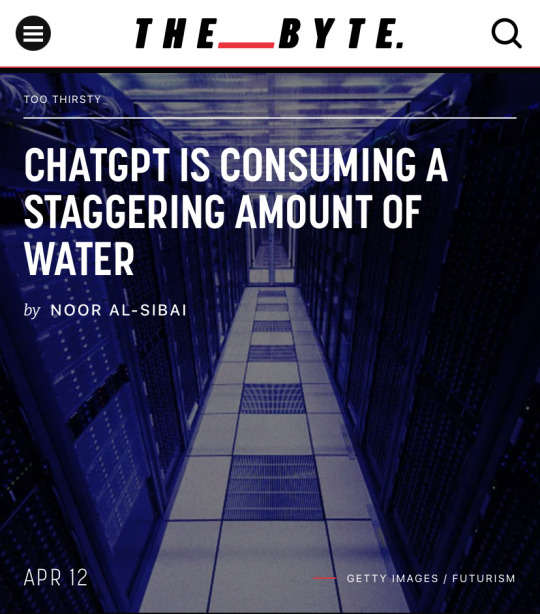
So it turns out that ChatGPT not only uses a ton shit of energy, but also a ton shit of water. This is according to a new study by a group of researchers from the University of California Riverside and the University of Texas Arlington, Futurism reports.
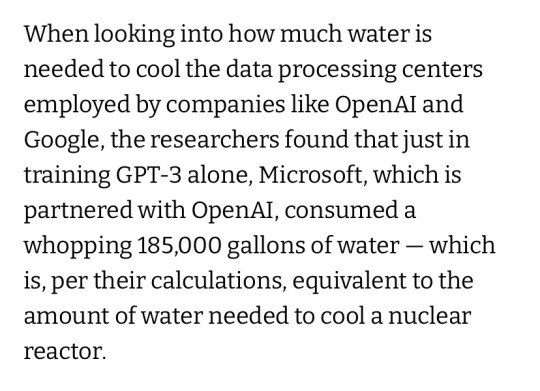
Which sounds INSANE but also makes sense when you think of it. You know what happens to, for example, your computer when it’s doing a LOT of work and processing. You gotta cool those machines.
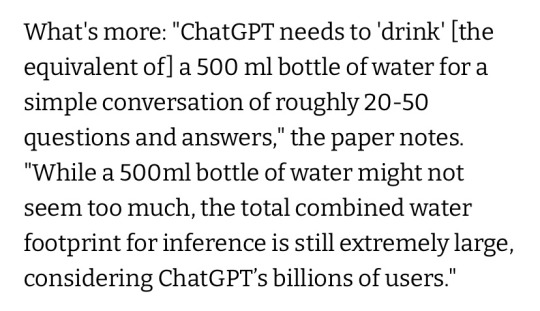
And what’s worrying about this is that water shortages are already an issue almost everywhere, and over this summer, and the next summers, will become more and more of a problem with the rising temperatures all over the world. So it’s important to have this in mind and share the info. Big part of how we ended up where we are with the climate crisis is that for a long time politicians KNEW about the science, but the large public didn’t have all the facts. We didn’t have access to it. KNOWING about things and sharing that info can be a real game-changer. Because then we know up to what point we, as individuals, can have effective actions in our daily lives and what we need to be asking our legislators for.
And with all the issues AI can pose, I think this is such an important argument to add to the conversation.
Edit: I previously accidentally typed Colorado instead of California. Thank you to the fellow user who noticed and signaled that!
#lem talks#let’s get political#science#science tumblr#politics#research#artificial intelligence#AI#climate#important
38K notes
·
View notes
Text
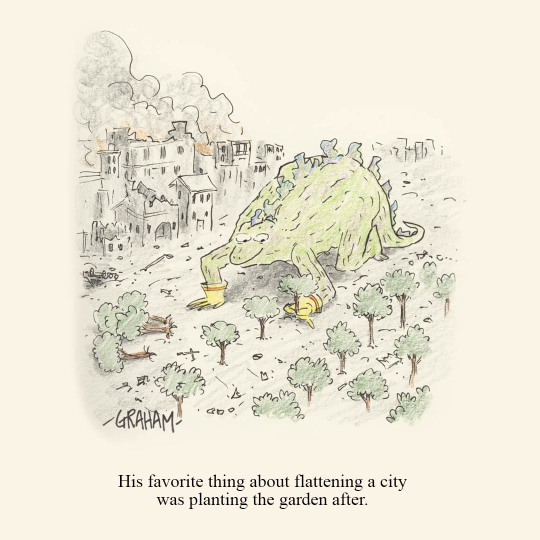
Helping the Earth.
14K notes
·
View notes
Text
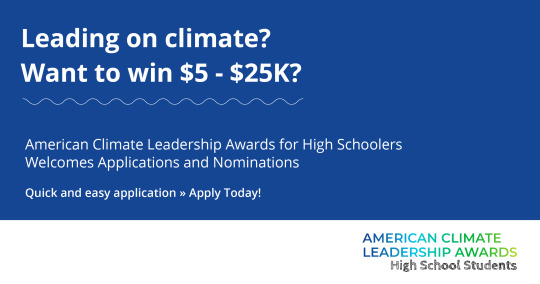
Last call: It's the final week to apply for the American Climate Leadership Awards for High School Students! Apply by Friday, December 15, at midnight PT!
ANNOUNCING: American Climate Leadership Awards has a new category for high school students working towards local climate solutions! @ecoamerica is awarding $125K in cash prizes to student climate leaders. Apply by 12/15: https://ecoamerica.org/american-climate-leadership-awards-high-school-2024/
#ACLA24HighSchoolStudents#ACLA24#high school#high school students#school#education#climate education#environmental education#climate and education#environment and education#climate action#climate and environment#climate#climate and health#climate blog#climate change#climate justice#climate news#weather and climate#environmental news#environment#environmental awareness#environmental activism#environmental justice#environmental#environment protection#environment and health#environmental health
8K notes
·
View notes
Text

Confirmed: Summer 2023 Hottest in NASA’s Record
All three months of summer 2023 broke records. July 2023 was the hottest month ever recorded, and the hottest July. June 2023 was the hottest June, and August 2023 was the hottest August.
NASA’s temperature record, GISTEMP, starts in 1880, when consistent, modern recordkeeping became possible. Our record uses millions of measurements of surface temperature from weather stations, ships and ocean buoys, and Antarctic research stations. Other agencies and organizations who keep similar global temperature records find the same pattern of long-term warming.
Global temperatures are rising from increased emissions of greenhouse gasses, like carbon dioxide and methane. Over the last 200 years, humans have raised atmospheric CO2 by nearly 50%, primarily through the burning of fossil fuels.
Drivers of climate change, both natural and human-caused, leave distinct fingerprints. Through observations and modeling, NASA researchers confirm that the current warming is the result of human activities, particularly increased greenhouse gas emissions.
6K notes
·
View notes
Text
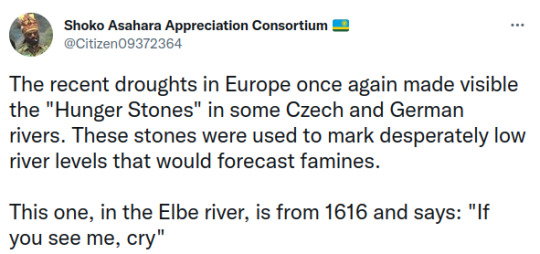


.
39K notes
·
View notes
Text


#keir starmer#leftism#socialism#ecosocialism#environment#environmetalists#climate change#climate crisis#climate#climate action#climate disaster#capitalism#anti capitalism#communism#britain
7K notes
·
View notes
Text
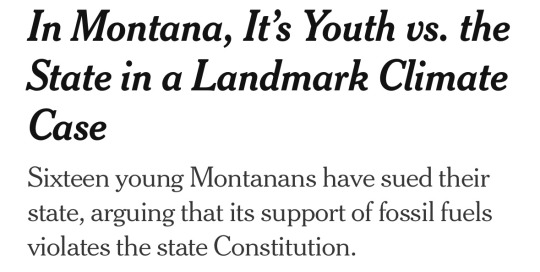
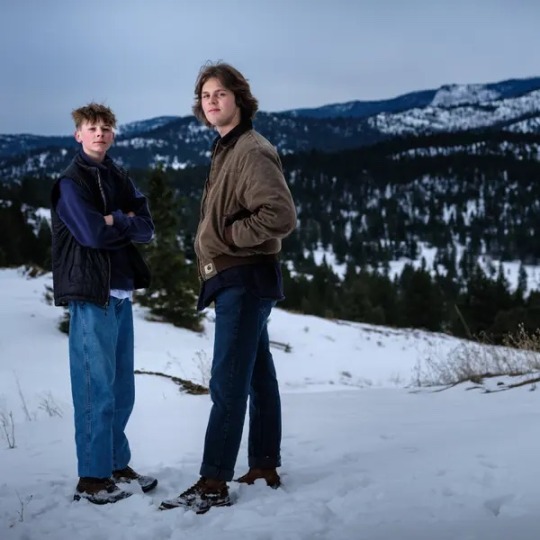
Source
“the young activists seized on language in the Montana state Constitution that guarantees residents ‘the right to a clean and healthful environment,’ and stipulates that the state and individuals are responsible for maintaining and improving the environment ‘for present and future generations.’”
#politics#us politics#Montana#climate#climate justice#gen z#current events#news#environment#environmentalism#environmental justice
12K notes
·
View notes
Text

Trust science, not corporate shills.
1K notes
·
View notes
Text
REBLOG THIS TO TELL CLIMATE CHANGE DENIERS TO GET THE HECK OFF YOUR BLOG
#reblog#chain post#not forced#hellsite#climate#climate justice#climate crisis#climate change#climate action
141 notes
·
View notes
Text

A.2.6 Why is solidarity important to anarchists?
Solidarity, or mutual aid, is a key idea of anarchism. It is the link between the individual and society, the means by which individuals can work together to meet their common interests in an environment that supports and nurtures both liberty and equality. For anarchists, mutual aid is a fundamental feature of human life, a source of both strength and happiness and a fundamental requirement for a fully human existence.
Erich Fromm, noted psychologist and socialist humanist, points out that the “human desire to experience union with others is rooted in the specific conditions of existence that characterise the human species and is one of the strongest motivations of human behaviour.” [To Be or To Have, p.107]
Therefore anarchists consider the desire to form “unions” (to use Max Stirner’s term) with other people to be a natural need. These unions, or associations, must be based on equality and individuality in order to be fully satisfying to those who join them — i.e. they must be organised in an anarchist manner, i.e. voluntary, decentralised, and non-hierarchical.
Solidarity — co-operation between individuals — is necessary for life and is far from a denial of liberty. Solidarity, observed Errico Malatesta, “is the only environment in which Man can express his personality and achieve his optimum development and enjoy the greatest possible wellbeing.” This “coming together of individuals for the wellbeing of all, and of all for the wellbeing of each,” results in “the freedom of each not being limited by, but complemented — indeed finding the necessary raison d’etre in — the freedom of others.” [Anarchy, p. 29] In other words, solidarity and co-operation means treating each other as equals, refusing to treat others as means to an end and creating relationships which support freedom for all rather than a few dominating the many. Emma Goldman reiterated this theme, noting “what wonderful results this unique force of man’s individuality has achieved when strengthened by co-operation with other individualities . .. co-operation — as opposed to internecine strife and struggle — has worked for the survival and evolution of the species… . only mutual aid and voluntary co-operation … can create the basis for a free individual and associational life.” [Red Emma Speaks, p. 118]
Solidarity means associating together as equals in order to satisfy our common interests and needs. Forms of association not based on solidarity (i.e. those based on inequality) will crush the individuality of those subjected to them. As Ret Marut points out, liberty needs solidarity, the recognition of common interests:
“The most noble, pure and true love of mankind is the love of oneself. I want to be free! I hope to be happy! I want to appreciate all the beauties of the world. But my freedom is secured only when all other people around me are free. I can only be happy when all other people around me are happy. I can only be joyful when all the people I see and meet look at the world with joy-filled eyes. And only then can I eat my fill with pure enjoyment when I have the secure knowledge that other people, too, can eat their fill as I do. And for that reason it is a question of my own contentment, only of my own self, when I rebel against every danger which threatens my freedom and my happiness…” [Ret Marut (a.k.a. B. Traven), The BrickBurner magazine quoted by Karl S. Guthke, B. Traven: The life behind the legends, pp. 133–4]
To practice solidarity means that we recognise, as in the slogan of Industrial Workers of the World, that “an injury to one is an injury to all.” Solidarity, therefore, is the means to protect individuality and liberty and so is an expression of self-interest. As Alfie Kohn points out:
“when we think about co-operation… we tend to associate the concept with fuzzy-minded idealism… This may result from confusing co-operation with altruism… Structural co-operation defies the usual egoism/altruism dichotomy. It sets things up so that by helping you I am helping myself at the same time. Even if my motive initially may have been selfish, our fates now are linked. We sink or swim together. Co-operation is a shrewd and highly successful strategy — a pragmatic choice that gets things done at work and at school even more effectively than competition does… There is also good evidence that co-operation is more conductive to psychological health and to liking one another.” [No Contest: The Case Against Competition, p. 7]
And, within a hierarchical society, solidarity is important not only because of the satisfaction it gives us, but also because it is necessary to resist those in power. Malatesta’s words are relevant here:
“the oppressed masses who have never completely resigned themselves to oppress and poverty, and who … show themselves thirsting for justice, freedom and wellbeing, are beginning to understand that they will not be able to achieve their emancipation except by union and solidarity with all the oppressed, with the exploited everywhere in the world.” [Anarchy, p. 33]
By standing together, we can increase our strength and get what we want. Eventually, by organising into groups, we can start to manage our own collective affairs together and so replace the boss once and for all. ”Unions will… multiply the individual’s means and secure his assailed property.” [Max Stirner, The Ego and Its Own, p. 258] By acting in solidarity, we can also replace the current system with one more to our liking: “in union there is strength.” [Alexander Berkman, What is Anarchism?, p. 74]
Solidarity is thus the means by which we can obtain and ensure our own freedom. We agree to work together so that we will not have to work for another. By agreeing to share with each other we increase our options so that we may enjoy more, not less. Mutual aid is in my self-interest — that is, I see that it is to my advantage to reach agreements with others based on mutual respect and social equality; for if I dominate someone, this means that the conditions exist which allow domination, and so in all probability I too will be dominated in turn.
As Max Stirner saw, solidarity is the means by which we ensure that our liberty is strengthened and defended from those in power who want to rule us: “Do you yourself count for nothing then?”, he asks. “Are you bound to let anyone do anything he wants to you? Defend yourself and no one will touch you. If millions of people are behind you, supporting you, then you are a formidable force and you will win without difficulty.” [quoted in Luigi Galleani’s The End of Anarchism?, p. 79 — different translation in The Ego and Its Own, p. 197]
Solidarity, therefore, is important to anarchists because it is the means by which liberty can be created and defended against power. Solidarity is strength and a product of our nature as social beings. However, solidarity should not be confused with “herdism,” which implies passively following a leader. In order to be effective, solidarity must be created by free people, co-operating together as equals. The “big WE” is not solidarity, although the desire for “herdism” is a product of our need for solidarity and union. It is a “solidarity” corrupted by hierarchical society, in which people are conditioned to blindly obey leaders.
#faq#anarchy faq#revolution#anarchism#daily posts#communism#anti capitalist#anti capitalism#late stage capitalism#organization#grassroots#grass roots#anarchists#libraries#leftism#social issues#economy#economics#climate change#climate crisis#climate#ecology#anarchy works#environmentalism#environment#solarpunk#anti colonialism#mutual aid#cops#police
31 notes
·
View notes
Text
if you want, tell me where you live (can also just be the country/area) and the percentage! and if this is normal/average for this time of year, if you happen to know
3K notes
·
View notes
Text
Kickstarting the audiobook of The Lost Cause, my novel of environmental hope
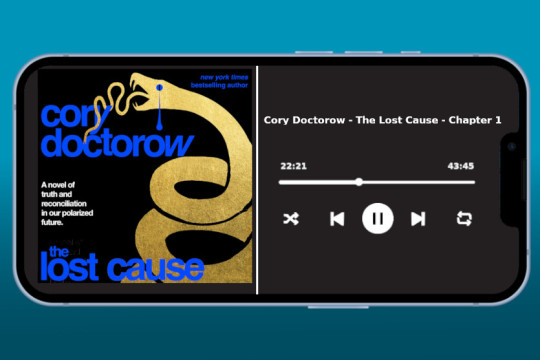
Tonight (October 2), I'm in Boise to host an event with VE Schwab. On October 7–8, I'm in Milan to keynote Wired Nextfest.

The Lost Cause is my next novel. It's about the climate emergency. It's hopeful. Library Journal called it "a message hope in a near-future that looks increasingly bleak." As with every other one of my books Amazon refuses to sell the audiobook, so I made my own, and I'm pre-selling it on Kickstarter:
https://www.kickstarter.com/projects/doctorow/the-lost-cause-a-novel-of-climate-and-hope
That's a lot to unpack, I know. So many questions! Including this one: "How is it that I have another book out in 2023?" Because this is my third book this year. Short answer: I write when I'm anxious, so I came out of lockdown with nine books. Nine!
Hope and writing are closely related activities. Hope (the belief that you can make things better) is nothing so cheap and fatalistic as optimism (the belief that things will improve no matter what you do). The Lost Cause is full of people who are full of hope.
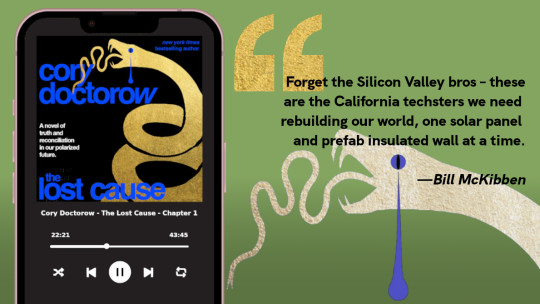
The action begins a full generation after the Hail Mary passage of the Green New Deal, and the people who grew up fighting the climate emergency (rather than sitting hopelessly by while the powers that be insisted that nothing could or should be done) have a name for themselves: they call themselves "the first generation in a century that doesn't fear the future."
I fear the future. Unchecked corporate power has us barreling over a cliff's edge and all the one-percent has to say is, "Well, it's too late to swerve now, what if the bus rolls and someone breaks a leg? Don't worry, we'll just keep speeding up and leap the gorge":
https://locusmag.com/2022/07/cory-doctorow-the-swerve/
That unchecked corporate power has no better avatar than Amazon, one of the tech monopolies that has converted the old, good internet into "five giant websites, each filled with screenshots of the other four":
https://twitter.com/tveastman/status/1069674780826071040
Amazon maintains a near-total grip over print and ebooks, but when it comes to audiobooks, that control is total. The company's Audible division has captured more than 90% of the market, and it abuses that dominance to cram Digital Rights Management onto every book it sells, even if the author doesn't want it:
https://pluralistic.net/2022/07/25/can-you-hear-me-now/#acx-ripoff
I wrote a whole-ass book about this and it came out less than a month ago; it's called The Internet Con and it lays out an audacious plan to halt the internet's enshittification and throw it into reverse:
http://www.seizethemeansofcomputation.org/
The tldr is this: when an audiobook is wrapped in Amazon's DRM, only Amazon can legally remove it. That means that every book I sell you on Audible is a book you have to throw away if you ever break up with Amazon, and Amazon can use the fact that it's hold you hostage to screw me – and every other author – over.
As I said last time this came up:
Fuck that sideways.
With a brick.

My books are sold without DRM, so you can play them in any app and do anything copyright permits, and that means Amazon won't carry them, and that means my publishers don't want to pay to produce them, and that means I produce them myself, and then I make the (significant) costs back by selling them on Kickstarter.
And you know what? It works. Readers don't want DRM. I mean, duh. No one woke up this morning and said, "Dammit, why won't someone sell me a product that lets me do less with my books?" I sell boatloads" of books through these crowdfunding campaigns. I sold so many copies of my last book, *The Internet Con, that they sold out the initial print run in two weeks (don't worry, they held back stock for my upcoming events).
But beyond that, I think there's another reason my readers keep coming back, even though I wrote a genuinely stupid number of books while working through lockdown anxiety while the wildfires raged and ashes sifted down out of the sky and settled on my laptop as I lay in my backyard hammock, pounding my keyboard.
(I went through two keyboards during lockdown. Thankfully, I bought a user-serviceable laptop from Framework and fixed it myself both times, in a matter of minutes. No, no one pays me to mention this, but hot damn is it cool.)
https://pluralistic.net/2022/11/13/graceful-failure/#frame
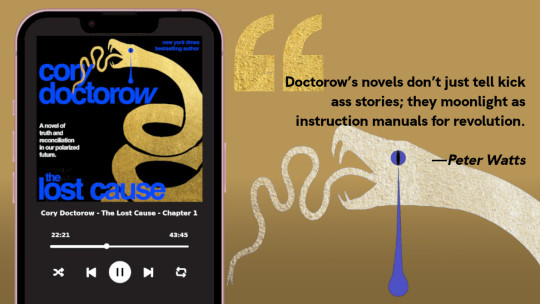
The reason readers come back to my books is that they're full of hope. In the same way that writing lets me feel like I'm not a passenger in life, but rather, someone with a say in my destination, the books that I write are full of practical ways and dramatic scenes in which other people seize the means of computation, the reins of power or their own destinies.
The protagonist of The Lost Cause is Brooks Palazzo, a high-school senior in Burbank whose parents were part of the original cohort of volunteers who kicked off the global transformation, and left him an orphan when they succumbed to one of the zoonotic plagues that arise every time another habitat is destroyed.
Brooks grew up knowing what his life would be: the work of repair and care, which millions of young people are doing. Relocating entire cities off endangered coastlines and floodplains, or out of fire-zones. Fighting floods and fires. Caring for tens of millions of refugees for whom the change came too late.
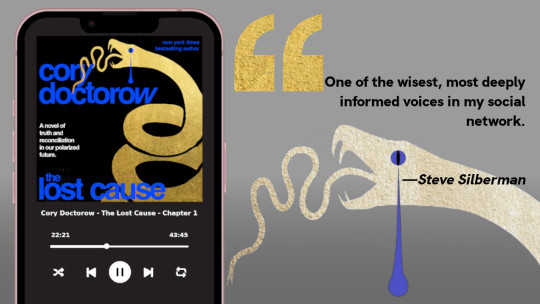
But with every revolution comes a counter-revolution. The losers of a just war don't dig holes, climb inside and pull the dirt down on top of themselves. Two groups of reactionaries – seagoing anarcho-capitalist billionaire wreckers and seething white nationalist militias – have formed an alliance.
They've already gotten their champion into the White House. Next up: dismantling every cause for hope Brooks and his friends have, and bringing back the fear.
That's the setup for a novel about solidarity, care, library socialism, and snatching victory from defeat's jaws. Writing it help keep me sane during the lockdown, and when it came time to record the audiobook, I spent a lot of time thinking about who could read it. I've had some great narrators: Wil Wheaton, @neil-gaiman, Amber Benson, Bronson Pinchot, and more.

I record my audiobooks with Skyboat Media, a brilliant studio near my place in LA. Back in August, I spent a week in their recording booth – "The Tardis" – doing something I'd never tried before: I recorded a whole audiobook, with directorial supervision: The Internet Con:
https://transactions.sendowl.com/products/78992826/DEA0CE12/purchase
When it was done, the director – audiobook legend Gabrielle de Cuir – sat me down and said, "Look, I've never said this to an author before, but I think you should read The Lost Cause. I don't direct anyone anymore except for Wil Wheaton and LeVar Burton, but I would direct you on this one."
I was immensely flattered – and very nervous. Reading The Internet Con was one thing – the book is built around the speeches I've been giving for 20 years and I knew I could sell those lines – but The Lost Cause is a novel, with a whole cast of characters. Could I do it?
Reader, I did it. I just listened to the proofs last week and:
It.
Came.
Out.
Great.
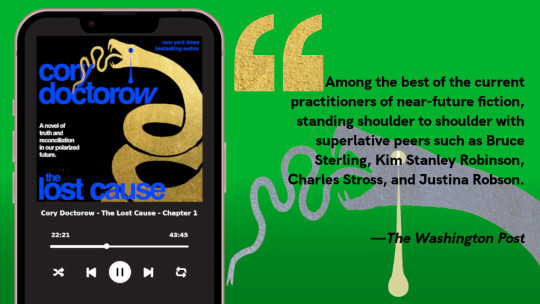
The Lost Cause goes on sale on November 14th, and I'll be selling this audiobook I made everywhere audiobooks are sold – except for the stores that require DRM, nonconsensually shackling readers and writers to their platforms. So you'll be able to get it on Libro.fm, downpour.com, even Google Play – but not Audible, Apple Books, or Audiobooks.com.
But in addition to those worthy retailers, I will be sending out thousands – and thousands! – of audiobook to my Kickstarter backers on the on-sale date, either as a folder of DRM-free MP3s, or as a download code for Libro.fm, to make things easy for people who don't want to have to figure out how to sideload an audiobook into a standalone app.
And, of course, the mobile duopoly have made this kind of sideloading exponentially harder over the past decade, though far be it from me to connect this with their policy of charging 30% commissions on everything sold through an app, a commission they don't receive if you get your files on the web and load 'em yourself:
https://www.kickstarter.com/projects/doctorow/red-team-blues-another-audiobook-that-amazon-wont-sell/posts/3788112
As with my previous Kickstarters, I'm also selling ebooks and hardcovers – signed or unsigned, and this time I've found a great partner to fulfill EU orders from within the EU, so backers won't have to pay VAT and customs charges. The wonderful Otherland – who have hosted me on my last two trips to Berlin – are going to manage that shipping for me:
https://www.otherland-berlin.de/en/home.html
Kim Stanley Robinson read the book and said, "Along with the rush of adrenaline I felt a solid surge of hope. May it go like this." That's just about the perfect quote, because the book is a ride. It's not just a kumbaya tale of a better world that is possible: it's a post-cyberpunk novel of high-tech guerrilla and meme warfare, climate tech and bad climate tech, wildcat prefab urban infill, and far-right militamen who adapt to a ban on assault-rifles by switching to super-soakers full of hydrochloric acid.
It's a book about struggle, hope in the darkness, and a way through this rotten moment. It's a book that dares to imagine that things might get worse but also better. This is a curious emotional melange, but it's one that I'm increasingly feeling these days.
Like, Amazon, that giant bully, whose blockade on DRM-free audiobooks cost me enough money to pay off my mortgage and put my kid through university (according to my agent)? The incredible Lina Khan brought a long-overdue antitrust case against Amazon while her rockstar DoJ counterpart, Jonathan Kanter, is dragging Google through the courts.
The EU is taking on Apple, and French cops are kicking down Nvidia's doors and grabbing their files, looking to build another antitrust case for monopolizing GPUs. The writers won their strike and Joe Biden walked the picket-line with the UAW, the first president in history to join striking workers:
https://doctorow.medium.com/joe-biden-is-headed-to-a-uaw-picket-line-in-detroit-f80bd0b372ab?sk=f3abdfd3f26d2f615ad9d2f1839bcc07

Solar is now our cheapest energy source, which is wild, because if we could only capture 0.4% of the solar energy that makes it through the atmosphere, we could give everyone alive the same energy budget as Canadians (who have American lifestyles but higher heating bills). As Deb Chachra writes in her forthcoming How Infrastructure Works (my review pending): we get a fresh supply of energy every time the sun rises and we only get new materials when a comet survives atmospheric entry, but we treat energy as scarce and throw away our materials after a single use:
https://www.penguinrandomhouse.com/books/612711/how-infrastructure-works-by-deb-chachra/
Anything that can't go on forever will eventually stop. We have shot past many of our planetary boundaries and there are waves of climate crises in our future, but they don't have to be climate disasters. That's up to us – it'll depend on whether we come together to save ourselves and each other, or tear ourselves apart.
The Lost Cause dares to imagine what it might be like if we do the former. We don't live in a post-enshittification world yet, but we could. With these indie audiobooks, I've found a way to treat the terminal enshittification of the Amazon monopoly as damage and route around it. I hope you'll back the Kickstarter, fight enshittification, inject some hope into your reading, and enjoy a kickass adventure novel in the process:
https://www.kickstarter.com/projects/doctorow/the-lost-cause-a-novel-of-climate-and-hope

If you'd like an essay-formatted version of this post to read or share, here's a link to it on pluralistic.net, my surveillance-free, ad-free, tracker-free blog:
https://pluralistic.net/2023/10/02/the-lost-cause/#the-first-generation-that-doesnt-fear-the-future
#pluralistic#audiobooks#the lost cause#crowdfunding#kickstarter#spoken word#climate#climate emergency#monopoly#drm#amazon#audible#skyboat#science fiction#hope not optimism
2K notes
·
View notes
Text
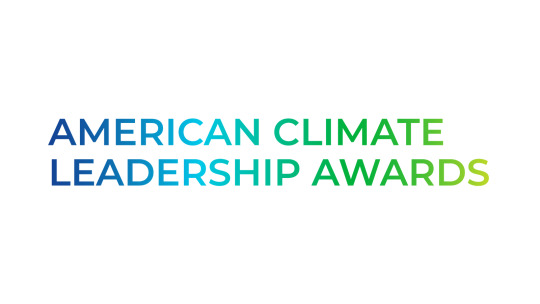
Last call: It's the final week to apply for the American Climate Leadership Awards! Apply by Friday, December 15, at midnight PT!
Calling all climate leaders! 2024 marks 5 years of @ecoamerica’s American Climate Leadership Awards, and applications are open now! Your efforts toward climate solutions can earn a share of $175,000! You may be awarded $1,000 just for qualifying as a semifinalist. Apply here for your chance: https://ecoamerica.org/american-climate-leadership-awards-2024/
#ACLA24Leaders#ACLA24#climate leaders#climate solutions#climate action#climate and environment#climate#climate and health#climate blog#climate change#climate justice#climate news#weather and climate#environmental news#environment#environmental awareness#environmental justice#environmental#environment protection#environment and health#environmental health
8K notes
·
View notes